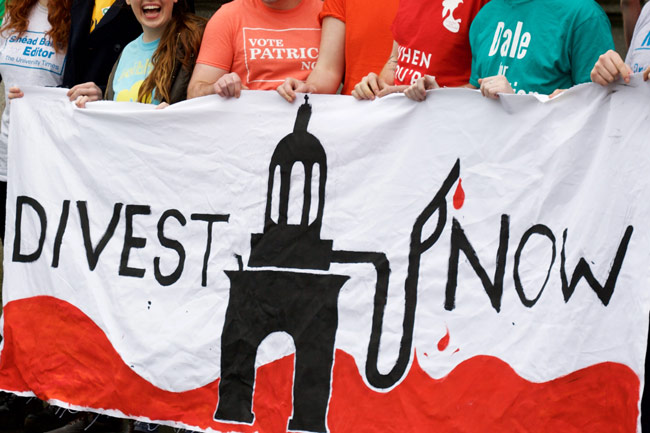Fossil Free TCD staged a protest outside the Dáil yesterday to show support for a private member’s bill that proposes a ban on fracking in Ireland.
Joined by other environmental activists such as Friends of the Earth and other divestment campaigns like Fossil Free Berlin, the demonstrators aim was to ensure that the bill, which gained enough votes to move to the next stage of the legislative process, was successful. The bill proposes a ban on hydraulic fracking, which involves drilling down into the earth before a high-pressure water mixture is directed at shale, to release oil and gas.
Speaking to The University Times outside Leinster House yesterday, one of the leaders of Fossil Free TCD, Aine O’Gorman said: “We want to make sure it’s banned outright. If we’re serious about [the Paris Agreement], and if we’re serious about our future we have to.”
The Paris Agreement is a UN agreement adopted in 2015 and due to come into force in November of this year. The agreement, to which Ireland is party, stipulates that the global average temperature must be kept within two degrees above pre-industrial levels.
Citing a study by advocacy organisation Oil Change International, activist with the Fossil Free Berlin campaign Louise Fitzgerald, speaking to The University Times, said: “What we’ve opened up in terms of fossil fuels will bring us over the two degree limit of safe global warming that will ensure a safe environment, a safe future.” Fracking, according to both Fitzgerald and O’Gorman, will lead only make this worse.
Environmentalists have been highly critical of fracking, which they say causes significant environmental damage. It is claimed that potentially carcinogenic chemicals used may escape and contaminate groundwater around the fracking site, and that the technique can cause small tremors.
Moreover they have argued that the method represents a short-term solution to what is a wider issue. Proponents of the technique say that it could help meet increasing demands on energy, and be of great economic benefit, with the potential to create hundreds of jobs.
The Prohibition of the Exploration and Extraction of Onshore Petroleum Bill was brought by Fine Gael TD Tony McLoughlin, and comes as the Department of Communications, Climate Action and Energy wait for the release of a report on fracking from the Environmental Protection Agency.
Presenter of RTE’s Eco-Eye and prominent environmental advocate Duncan Stewart was also present. Speaking to The University Times, Stewart was vocal in his opposition to fracking, and for the need for students to take action: “This is a warning. It would be extremely unwise and irresponsible for any government in Ireland not to have an outright ban on fracking.”
He continued: “Effectively we’re already stealing from your generation. We’re stealing your future through climate change. Young people need to come together on mass to fight this.”
Fossil Free TCD has spent months lobbying to urge college to pull its investment from fossil fuels, an industry in which Trinity currently indirectly invests €6.1 million. Trinity’s Finance Committee will publish a report outlining its position on divestment in November.
Colm Tong, another of the leaders of Fossil Free TCD, commented on how common fracking is in the US, where a substantial amount of energy comes from method. He was of the opinion that to allow fracking would be to go past the point of no return for the country: “It’s really the only opportunity we have.”
Tong was disappointed somewhat by the turnout on the day: “We would have liked to have have mobilised more people.” However, he also said that the issue was not well broadcast in media, adding that the fracking “doesn’t get the coverage it deserves”.
“I cannot understand why students are not rebelling en masse against what’s happening in this country”, Stewart said.
“What’s being done is really important. It’s crucial for your generation’s future, your generation is going to be the most exposed”, he added.







